In the wasteland of summer launches for 2012 (I mean, Lollipop Chainsaw was good, but it wasn't "keep me busy for two months" amazing), I somehow missed out on the original Theatrhythm Final Fantasy. It's kind of funny and disappointing that I did, because I still hold that Elite Beat Agents is one of the greatest video games ever made, and adding Final Fantasy's music to the mix could only be a good thing. Recently-released sequel Curtain Call is my first experience with the series, and I have to say that I'm pretty satisfied all around as both a fan of music games and a lapsed Final Fantasy fan.
Curtain Call is a pretty straightforward rhythm game--play songs to unlock more songs--but following Final Fantasy tradition, there's a story that you can thankfully skip in favor of getting to play the game. Much like Dissidia Final Fantasy, the twin forces of Chaos and Control are fighting for the fate of the universe, and champions from multiple worlds and timelines (i.e. from multiple Final Fantasy titles) are brought together to save the day. Curtain Call adds a ton of new music, pulling from newer titles like Final Fantasy XIII-2, Lightning Returns, and Final Fantasy XIV: A Realm Reborn, along with older titles like Final Fantasy: Mystic Quest and movies like Advent Children.
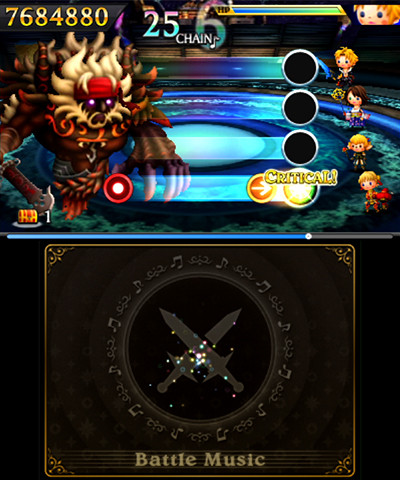
Gameplay is the exact same as the original, split up into Battle, Field, and Event stages, each drawing influence from different rhythm games. Battle stages pit you against a series of enemies and regular bosses, working in a fast-moving stationary field similar to the Guitar Hero or Rock Band games, complete with "star power" that can cast a screen-clearing Summon. Field stages are basically on-foot or airship travel stages, and play like a more linear Gitaroo Man--do well enough (and clear "star power" segments) and you'll travel faster and farther. Event stages have a movie going on in the background while you play something that's closest to Elite Beat Agents, but these are purely score attack stages with no other "game" involved.
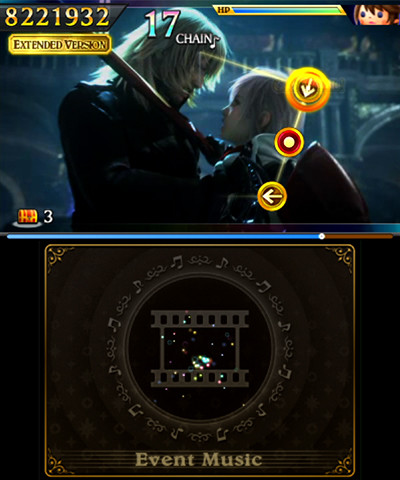
So wheeeeeeeeeeeeeeeeeen you hold on to/the past, then you/will break down what little is left
Theatrhythm veterans already know that the game's controls are flexible, allowing both stylus and button play. While I was partial to stylus controls from my EBA experience, I found controls with the buttons to actually be easier (just pretend you're doing Geese Howard's Deadly Rave). Overall, the controls were easy to pick up and difficult to master--even with over 10,000 Rhythmia (your overarching experience/score), there are a few songs I'm just not good enough to clear on higher difficulties.
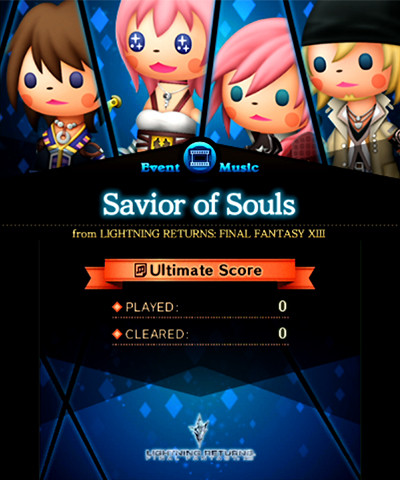
Speaking of difficulties, the challenge ramps up pretty solidly--Basic gives you a chance to learn a song with a few inputs, Expert more closely follows the beat of the song and multiplies the number of inputs, and Ultimate just throws rhythm out the window and expects you to hit the most random shit possible, like long strings of single inputs during a period of silence. It's frustrating, though, that passing a song on Expert or Ultimate doesn't automatically give credit for a song on lower difficulties, but that's also a problem with rhythm games as a whole, not just Theatrhythm.
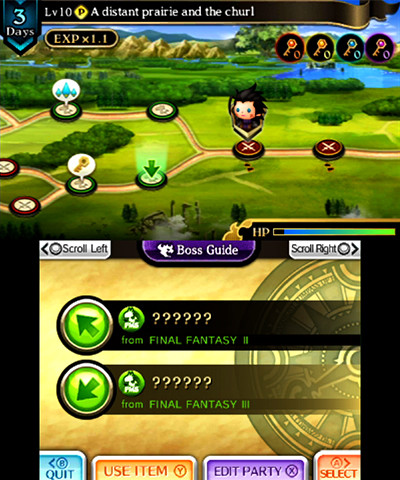
If you're in the mood for more long-term gaming, Quest Medley gives RPG-like branching paths, acting as kind of a survival mode. Working your way through each quest, you can use items to heal up between rounds or increase battle efficiency, but you're expected to play at multiple difficulties on each playthrough, so be prepared. Midboss and boss fights add some challenge, with stages doling out more rewards for how well you perform. The different quest lengths--Short, Medium, Long, and "Inherited" from StreetPass--all feel pretty similar, because it's not so much about how long it is on the first time through, but how many replays it'll take to completely finish them, like a skill-based Find Mii.
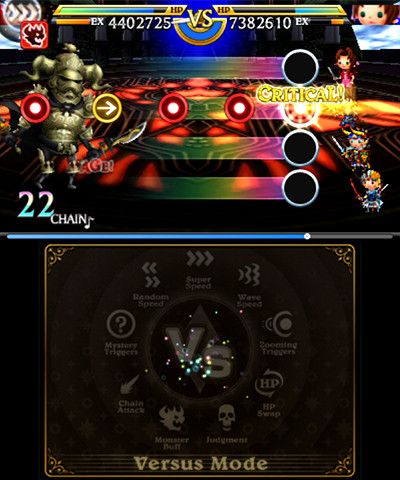
I keep bringing up Elite Beat Agents because A- it's perfect and B- it serves as a great analog to Theatrhythm Final Fantasy: Curtain Call, which has some cool options for versus play and StreetPass functionality. Once you unlock versus mode, you're able to set up a profile card, which allows other players to challenge your scores via StreetPass. Versus play isn't nearly as genteel as the single-player game--detrimental effects can come into play, like spinning directional inputs or changing your screen so only perfectly on-time inputs (Criticals) count, and everything else is a miss. This really adds to the challenge, keeping you on your toes even with songs you know by heart.
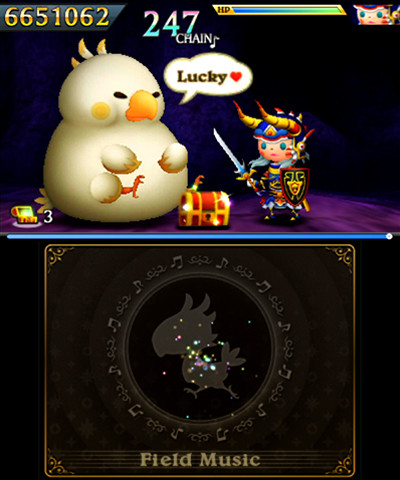
Theatrhythm Final Fantasy: Curtain Call is the rare kind of game that I just can't find any real problems with. It rewards skill and practice, the soundtrack is excellent, the character designs are adorable (Bjaker's sheer terror regarding them notwithstanding), and both sets of controls are tight, responsive, and comfortable. My only real issue--that I have to play easier difficulties to get full credit--is more a problem with the genre as a whole, and less with this individual title. Forget the characters and story of Final Fantasy--what I really take away from the series is the music, and Curtain Call is able to make even the less-loved chapters of Final Fantasy soar.
REVIEW ROUNDUP
+ Music taken from Final Fantasy's entire history, including side titles and movies
+ Responsive and flexible controls allow you to play with the stylus or with buttons--your pick!
+ Skill-based gameplay is easy to pick up, but worth taking the time to master
+ Challenging and satisfying, especially for experienced rhythm gamers
- Bjaker is terrified of the character designs... what's wrong with him?
No comments:
Post a Comment